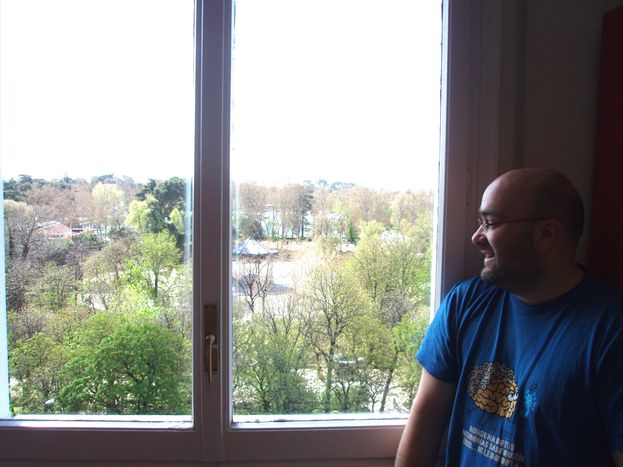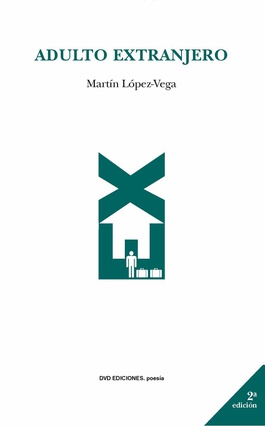
Spanish poet Martin Lopez-Vega: ‘Choose between culture and commerce’
Published on
Translation by:
 terrymcc
terrymcc
Looking out over Madrid’s Retiro park, the Spanish poet and translator ponders over his literary concerns and gives us his own brief synopsis of the current poetry scene
Martin Lopez-Vega greets us at the Madrid head office of Spanish-Mexican publishers Vaso Roto, where he works as an editor. The panoramic windows in his office offer a wonderful view of the Retiro park. ‘I like my poetry to be as clear as possible, because the world’s already complicated enough,’ says the 35-year-old from Asturias. ‘I also feel that writing obscure, hermetic poetry is far easier than writing clear poetry.’ A week before we meet, Lopez-Vega premiered his latest volume of poems at a bookshop in Madrid, in a tour encompassing Zaragoza and Barcelona too. Entitled Adult Foreigner (Adulto extranjero, DVD editions, 2010), it is already into its second edition, which is fairly unusual for Spain.
Generation Europe
 Over the last ten years, Lopez-Vega has established himself as one of the key names in the generation of Spanish poets born in the seventies and who are now producing work with their own, mature voice. They tend to look up to poets whose styles are as varied as their origins – German-born Israeli Yehuda Amijai, the Serbia-born American Charles Simic, Denmark’s Henrik Nordbrandt, Joseph Brodsky from Russia... Though not denying his great debt to those writing in his mother tongue, Lopez-Vega sees himself as part of a far broader tradition, distinguishing between neither countries nor continents. ‘If I say that Joseph Brodsky is one of my favourite poets, am I talking about a European or American poet? Without his last phase in the USA, I suspect Brodsky wouldn’t have reached the heights he did. My idea of the poetic tradition is quite similar to what you’ll find in a good poetry section in a bookshop in the United States – they’ve translated just about everything of any value. Having said that, categorising poets as European, American, Israeli and so it would be just a case of checking their passports, which would be deadly boring. In other words, yes. There is such a thing as a universal poetic tradition.'
Over the last ten years, Lopez-Vega has established himself as one of the key names in the generation of Spanish poets born in the seventies and who are now producing work with their own, mature voice. They tend to look up to poets whose styles are as varied as their origins – German-born Israeli Yehuda Amijai, the Serbia-born American Charles Simic, Denmark’s Henrik Nordbrandt, Joseph Brodsky from Russia... Though not denying his great debt to those writing in his mother tongue, Lopez-Vega sees himself as part of a far broader tradition, distinguishing between neither countries nor continents. ‘If I say that Joseph Brodsky is one of my favourite poets, am I talking about a European or American poet? Without his last phase in the USA, I suspect Brodsky wouldn’t have reached the heights he did. My idea of the poetic tradition is quite similar to what you’ll find in a good poetry section in a bookshop in the United States – they’ve translated just about everything of any value. Having said that, categorising poets as European, American, Israeli and so it would be just a case of checking their passports, which would be deadly boring. In other words, yes. There is such a thing as a universal poetic tradition.'
Adult Foreigner includes many poems written on the poet’s travels. Referring to the Swedish poet Kjell Erik Espmark, Lopez-Vega explains that travelling is an excellent opportunity to ‘get away from everyday life. The way we live now, it’s extremely hard to stop and think clearly about yourself and what surrounds you.’ Lopez-Vega is also an active translator from French, Portuguese, English and Italian. What is his opinion on the importance of languages as a cohesive element in the European union? ‘Language hasn’t got anything to do with it - more solid institutions are needed. Is the USA more cohesive than the EU? If you take a New Yorker and a farmer from Iowa, I don’t think so. In practice the EU has a common language, and it's the same as the one in the US. After all, we all understand each other in English.’
Commerce and culture
Compared with its neighbours, Spain does not exactly have high book readership rates. ‘Spain is probably one of the European countries where people read least,’ agrees Martin. ‘It must be due to a dreadful education system.’ He spent some years working in one of Spain’s most prestigious bookshop chains, La Central, and believes that commerce and culture have to be kept apart. ‘Bookshops such as La Central and a few others are happy to survive financially and extert a cultural influence. They can’t hope to make as much money as the large chains whose main aim is to increase profits. They pile new books up on tables and shelves with no apparent rationale, more or less in the order in which they come in, and they sell their window displays and main tables to the publishers who can afford to pay for them. The same can be said of smaller publishers. In most cases, they need to decide whether to go for culture or commerce, which doesn’t mean that there aren’t publishers who do well at both, of course.’ Lopez-Vega believes that Brussels should impose a fixed price on books. ‘These days, it’s the only way that small publishers and bookshops can survive.’
I don’t think any other literary genre can provide more satisfaction in less space
So why do many people regard poetry as a genre that the average reader finds difficult and challenging? ‘There’s no doubt that reading a poem is more difficult for someone who is only used to novels or essays, because the meaning is more concentrated and it plays much more at suggesting than at saying,’ confirms Lopez-Vega. ‘A good poem is a bit of a song, a bit of an equation and a bit of many other things. Yes it’s more difficult. But I don’t think any other literary genre can provide more satisfaction in less space. It's worth giving it a go!’
Images: main (cc) Dowlesan/ Flickr; Martin Lopez-Vega © Lino González Veiguela; book cover 'Adulto Extranjero/ DVD ediciones
Translated from El poeta Martín López-Vega: "Se debe escoger entre la cultura y el mercado"


